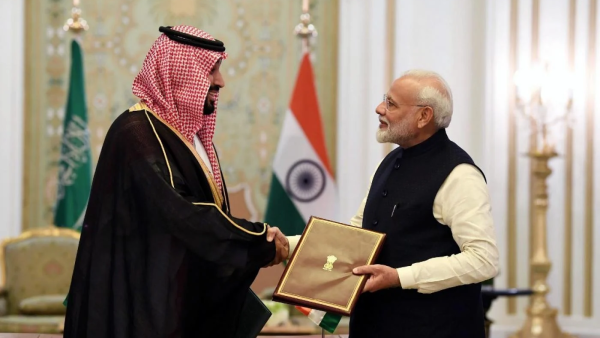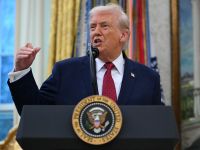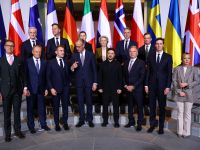Civilizational relations between India and the Arabian Peninsula have existed for thousands of years. After India's independence in 1947, diplomatic relations were established.
Although due to reasons such as the Cold War, India's "non-commitment" policy, the presence of two actors in opposite coalitions, the role of Pakistan, etc., the bilateral relations between Saudi Arabia and India were not friendly until the early 1990s, later, the collapse of the Soviet Union, strategic change of India's foreign policy, end of the Cold War, rise of India's position, new international and regional developments, the complementary economies of the two countries. These gave the motivations of both sides to strengthen their relations.
Apart from Manmohan Singh's important trip to Saudi Arabia in 2010, in the past years, we have witnessed the visits of senior officials such as the Saudi Crown Prince and the Prime Minister of India to each other's countries in February 2019, April 2016, and October 2019.
The establishment of the Strategic Partnership Council (SPC) between Saudi Arabia and India in October 2019 is the highest bilateral mechanism between the two countries and is a sign of the promotion of bilateral relations to new fields. In this regard, the volume of strategic relations between the two actors has increased in the past years and India has become one of Saudi Arabia's strategic partner countries in the vision of 2030.
Current geopolitical and political opportunities and goals of bilateral relations
One of the important reasons for the increasing proximity between New Delhi and Riyadh is the expansion of high-level meetings by officials and leaders of both countries.
Factors such as the gap between Saudi Arabia and the West, the decline of Saudi Arabia's trust in the United States and relations with it, the West's severe criticism of Saudi Arabia's performance, the decrease of America's need for energy resources in the region, and the diminution of America's presence, etc., play a role in Riyadh's attention to India.
In New Delhi's "pragmatic" foreign policy, India's desire to play a regional role is also tied to the weakening of America's regional presence and the strengthening of China's role as India's rival. In fact, the increasing convergence of strategic interests is related to filling the gap created by the United States in the Middle East. While China expands its strategic position in the region, India also needs the help of Saudi Arabia to develop its role in the Middle East. In this regard, in India's maritime security strategy, partnership with Saudi Arabia in the Indian Ocean region is important in facing China's geostrategic position.
However, India has to maintain a balance in its relations with Saudi Arabia and Iran (a strategic partner versus a major regional power). But the volume of trips and the recent emphasis of S. Jaishankar, the Minister of Foreign Affairs of India, on the importance of strategic relations between India and Saudi Arabia for growth, prosperity, stability, security and joint development, show that India has paid more attention to Riyadh.
India is working on important issues like UN Security Council reforms, and permanent membership in UN Security Council. In this regard, New Delhi has high hopes for support from Riyadh in this area.
In addition, the importance of strengthening the relations of the Cooperation Council with India to ensure common interests, finding areas of cooperation and ways to support and strengthen it is for the benefit of Riyadh and New Delhi.
Also, while Saudi Arabia is vulnerable to repeated attacks, India can strengthen Saudi Arabia. Riyadh seems to believe that by expanding relations with India, the scope of India-Iran relations can be reduced to some extent or it can be used to reduce tensions in the region.
On the other hand, although India's approach by announcing the cancellation of Article 370 of the Constitution increased the dispute with Pakistan, and other actors such as China and the United Nations criticized it, from the point of view of India, the soft approach of Saudi Arabia and its effect on the limited statements of the Organization of Islamic Cooperation is a positive approach.
In the meantime, while New Delhi extended support to Cyprus, Armenia, and Greece against Turkey in response to Erdogan's approach to Kashmir, it evaluates Riyadh's approach to Kashmir as a change in the direction of its strategic interests and reducing the pressure of Islamic countries. It even seems that India is also trying to take advantage of Saudi Arabia's role in persuading Pakistan to reduce tension with India.
If the differences between India and Saudi Arabia regarding Afghanistan, Taliban, Jihadists, etc., in the past were wide, this trend has decreased in the past years.
In fact, on the one hand, Saudi Arabia's help to India regarding non-interference in India's internal affairs, strengthening internal security, preventing Indians from joining the military ranks of ISIS, expelling high-level terrorists, and extraditing Indian members of ISIS in the Middle East is important. In this regard, New Delhi has tried to prevent the spread of tensions such as insulting the Prophet Muhammad inside India.
In this regard, despite the two countries' relatively different definitions of terrorism, fighting terrorism, sharing information related to terrorism, money laundering, drugs, arms, and human trafficking, and forming a comprehensive security dialogue, cooperation between them has been expanded.
In addition, the motives for cooperation between India and Saudi Arabia have also expanded in the field of security and defense. In fact, holding joint exercises, high-level and regular military trips, strengthening cooperation in the field of defense production, strengthening maritime security cooperation with India in the western Indian Ocean, sharing information, military exercises, etc. are part of the mutual interest in strengthening security cooperation and military in the current situation.
Also, the prospect of more cooperation between Saudi Arabia and India's space programs by signing a memorandum of understanding, developing the potential in the field of space technology, and peaceful use of space can benefit both sides.
Opportunities and economic goals of bilateral relations
Bilateral trade relations between India and Saudi Arabia have increased steadily since the mid-2000s. Now, the economic relations between the two countries have seen a lot of expansion after the coronavirus pandemic.
While probably in the next few years, India will become a 5 trillion dollar economy, variables such as the appropriate growth of India's GDP, India's fifth largest economy in the world, focus on technological developments, large startup infrastructure, being the second most populous country in the world, being a major exporter of labor, and the complementarity of the two countries economies have caused Saudi Arabia to pay more attention to India.
In line with economic reforms and diversification of the oil economy, diversification of assets, "2030 vision", and Aramco's transformation into ‘the world's largest sovereign wealth fund’, Riyadh needs India. In this regard, the vision of 2030, also introduces India as one of the eight countries selected for strategic partnership.
On the other hand, Saudi Arabia still considers India (the third largest consumer in the world) to be an essential and key market for oil. India also needs Saudi Arabia to greatly increase its refining capacity.
From New Delhi's point of view, Saudi Arabia (the largest source of crude oil and supplying 18% and 30% of crude oil and LPG needed by India) can play an important role in India's imports, energy security, and strategic oil reserves.
While India plans to attract more than 100 billion dollars of oil and gas infrastructure,. plans such as doubling the annual export of phosphate and ammonia products to the Indian market from 2023, and reviewing hydrogen energy as an energy source in the future have clarified the prospects of cooperation between the two countries. On the other hand, although India's investment in Saudi Arabia has stopped in some areas such as energy, refining, and petrochemicals, and is not in the previously announced trend of 100 billion dollars, but it is now progressing.
On the other hand, reputable Indian companies have established a strong presence in Saudi Arabia in tourism, housing, information technology, management and consulting services, construction projects, pharmaceuticals, etc. In addition, Saudi Arabia is the fourth largest trading partner of India and India is the second largest trading partner of Saudi Arabia. In the fiscal year 2021-2022, the value of bilateral trade was 42.8 billion dollars.
Increasing cooperation between the two countries in the field of food security, information and communication technology, emerging technologies such as artificial intelligence, new and renewable energies, simplifying the migration process of workers, and helping 2-3 million Indian diasporas are other parts of relations.
Future prospects of relations
What is clear is that Jaishankar called Saudi Arabia "an important player" in today's global economy. From India's point of view, the global influence of Saudi Arabia helps India to become an economic superpower. Also, while India is using its soft power and its good past in the region, increasing India's geopolitical position, decreasing Indian opposition, improving relations with Saudi Arabia, and even America's support for strengthening
India's role in the Middle East will cause Delhi to pay more attention to Saudi Arabia. Meanwhile, the role and challenges of Pakistan cannot reduce the volume of bilateral relations. In fact, it should be said that although energy and economy have been the driving force of India-Saudi relations, geopolitics, security, and military and new win-win cooperation will be the reason for the expansion of relations in the future.







